CATTI 二级笔译历年真题以及答案2006至2017
翻译资格证CATTI历年真题
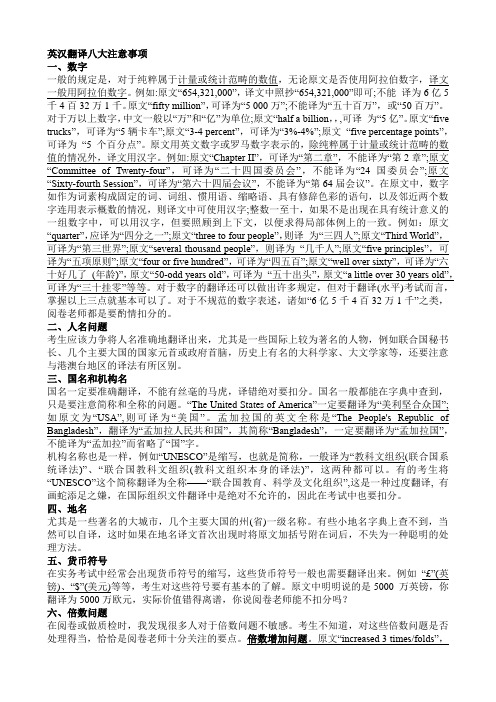
英汉翻译八大注意事项一、数字一般的规定是,对于纯粹属于计量或统计范畴的数值,无论原文是否使用阿拉伯数字,译文一般用阿拉伯数字。
例如:原文“654,321,000”,译文中照抄“654,321,000”即可;不能译为6亿5千4百32万1千。
原文“fifty million”,可译为“5 000万”;不能译为“五十百万”,或“50百万”。
对于万以上数字,中文一般以“万”和“亿”为单位;原文“half a billion,,,可译为“5亿”。
原文“five trucks”,可译为“5辆卡车”;原文“3-4 percent”,可译为“3%-4%”;原文“five percentage points”,可译为“5 个百分点”。
原文用英文数字或罗马数字表示的,除纯粹属于计量或统计范畴的数值的情况外,译文用汉字。
例如:原文“Chapter II”,可译为“第二章”,不能译为“第2章”;原文“Committee of Twenty-four”,可译为“二十四国委员会”,不能译为“24国委员会”;原文“Sixty-fourth Session”,可译为“第六十四届会议”,不能译为“第64届会议”。
在原文中,数字如作为词素构成固定的词、词组、惯用语、缩略语、具有修辞色彩的语句,以及邻近两个数字连用表示概数的情况,则译文中可使用汉字;整数一至十,如果不是出现在具有统计意义的一组数字中,可以用汉字,但要照顾到上下文,以便求得局部体例上的一致。
例如:原文“quarter”,应译为“四分之一”;原文“three to four people”,则译为“三四人”;原文“Third World”,可译为“第三世界”;原文“several thousand people”,则译为“几千人”;原文“five principles”,可译为“五项原则”;原文“four or five hundred”,可译为“四五百”;原文“well over sixty”,可译为“六十好几了(年龄)”,原文“50-odd years old”,可译为“五十出头”,原文“a little over 30 years old”,可译为“三十挂零”等等。
2006年11月CATTI_二级笔译实务真题及详解
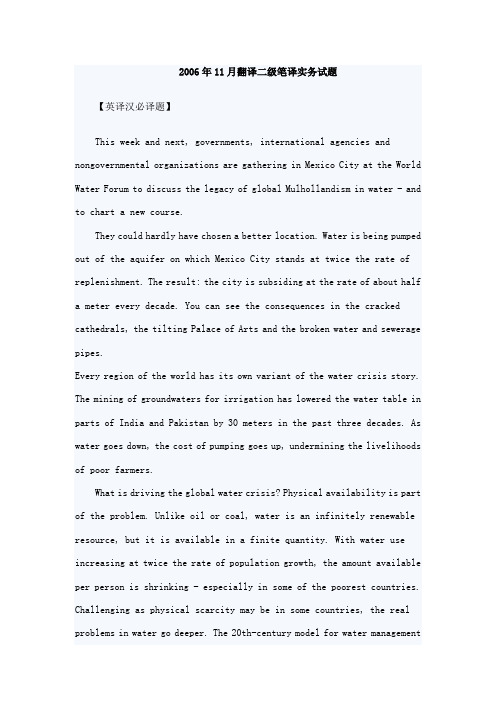
2006年11月翻译二级笔译实务试题【英译汉必译题】This week and next, governments, international agencies and nongovernmental organizations are gathering in Mexico City at the World Water Forum to discuss the legacy of global Mulhollandism in water - and to chart a new course.They could hardly have chosen a better location. Water is being pumped out of the aquifer on which Mexico City stands at twice the rate of replenishment. The result: the city is subsiding at the rate of about half a meter every decade. You can see the consequences in the cracked cathedrals, the tilting Palace of Arts and the broken water and sewerage pipes.Every region of the world has its own variant of the water crisis story. The mining of groundwaters for irrigation has lowered the water table in parts of India and Pakistan by 30 meters in the past three decades. As water goes down, the cost of pumping goes up, undermining the livelihoods of poor farmers.What is driving the global water crisis? Physical availability is part of the problem. Unlike oil or coal, water is an infinitely renewable resource, but it is available in a finite quantity. With water use increasing at twice the rate of population growth, the amount available per person is shrinking - especially in some of the poorest countries. Challenging as physical scarcity may be in some countries, the real problems in water go deeper. The 20th-century model for water managementwas based on a simple idea: that water is an infinitely available free resource to be exploited, dammed or diverted without reference to scarcity or sustainability.Across the world, water-based ecological systems - rivers, lakes and watersheds - have been taken beyond the frontiers of ecological sustainability by policy makers who have turned a blind eye to the consequences of over- exploitation.We need a new model of water management for the 21st century. What does that mean? For starters, we have to stop using water like there"s no tomorrow - and that means using it more efficiently at levels that do not destroy our environment. The buzz- phrase at the Mexico Water forum is "integrated water resource management." What it means is that governments need to manage the private demand of different users and manage this precious resource in the public interest.【参考译文】从本周直到下周,各国政府、国际机构和非政府组织齐聚墨西哥城,参与世界水论坛的召开,讨论全球形式化治水的遗留问题,并为此制定新的解决方案。
历年英语翻译资格考试二级笔译真题
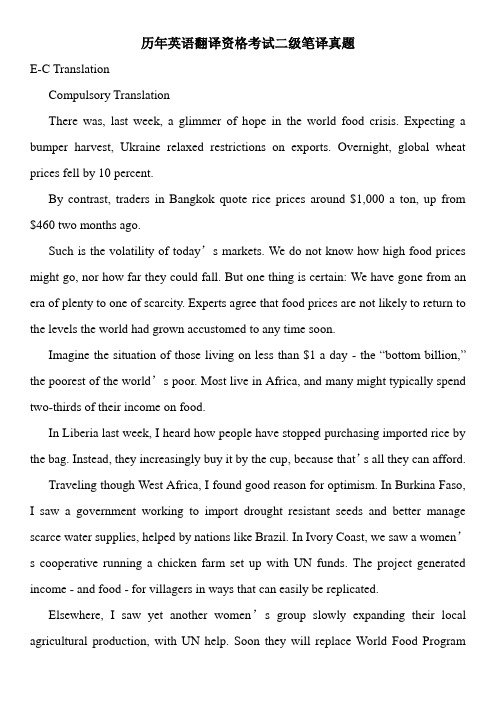
历年英语翻译资格考试二级笔译真题E-C TranslationCompulsory TranslationThere was, last week, a glimmer of hope in the world food crisis. Expecting a bumper harvest, Ukraine relaxed restrictions on exports. Overnight, global wheat prices fell by 10 percent.By contrast, traders in Bangkok quote rice prices around $1,000 a ton, up from $460 two months ago.Such is the volatility of today’s markets. We do not know how high food prices might go, nor how far they could fall. But one thing is certain: We have gone from an era of plenty to one of scarcity. Experts agree that food prices are not likely to return to the levels the world had grown accustomed to any time soon.Imagine the situation of those living on less than $1 a day - the “bottom billion,” the poorest of the world’s poor. Most live in Africa, and many might typically spend two-thirds of their income on food.In Liberia last week, I heard how people have stopped purchasing imported rice by the bag. Instead, they increasingly buy it by the cup, because that’s all they can afford.Traveling though West Africa, I found good reason for optimism. In Burkina Faso, I saw a government working to import drought resistant seeds and better manage scarce water supplies, helped by nations like Brazil. In Ivory Coast, we saw a women’s cooperative running a chicken farm set up with UN funds. The project generated income - and food - for villagers in ways that can easily be replicated.Elsewhere, I saw yet another women’s group slowly expanding their local agricultural production, with UN help. Soon they will replace World Food Programrice with their own home-grown produce, sufficient to cover the needs of their school feeding program.These are home-grown, grass-roots solutions for grass-roots problems - precisely the kind of solutions that Africa needs. optionalTopic 1For a decade, metallurgists studying the hulk of the Titanic have argued that the storied ocean liner went down quickly after hitting an iceberg because the ship’s builder used substandard rivets that popped their heads and let tons of icy seawater rush in. More than 1,500 people died.Now a team of scientists has moved into deeper waters, uncovering evidence in the builder’s own archives of a deadly mix of great ambitio n and use of low-quality iron that doomed the ship, which sank 96 years ago Tuesday.The scientists found that the ship’s builder, Harland and Wolff, in Belfast, struggled for years to obtain adequate supplies of rivets and riveters to build the world’s three biggest ships at once: the Titanic and two sisters, Olympic and Britannic.Each required three million rivets, and shortages peaked during Titanic’s construction.“The board was in crisis mode,” said Jennifer Hooper McCarty, a member of the team that studied the company’s archive and other evidence. “It was constant stress. Every meeting it was, ‘There’s problems with the rivets, and we need to hire more people.’ “The team collected other clues from 48 Titanic rivets, using modern tests, computer simulations, comparisons to century-old metals and careful documentation of what engineers and shipbuilders of the era considered state of the art.The scientists say the troubles began when the colossal plans forced Harland and Wolff to reach beyond its usual suppliers of rivet iron and include smaller forges, as disclosed in company and British government papers. Small forges tended to have less skill and experience.Adding to the threat, the company, in buying iron for Titanic’s rivets, ordered No. 3 bar, known as “best,” not No. 4, known as “best-best,” the scientists found. They also discovered that shipbuilders of the day typically used No. 4 iron for anchors, chains and rivets.So the liner, whose name was meant to be synonymous with opulence, in at least one instance relied on cheap materials.The scientists argue that better rivets would have probably kept the Titanic afloat long enough for rescuers to have arrived before the icy plunge, saving hundreds of lives.C-E TranslationCompulsory Translation“中国制造”模式遭遇发展瓶颈,这种模式必须要改进和提高。
2006-2012 二级笔译实务真题 catti
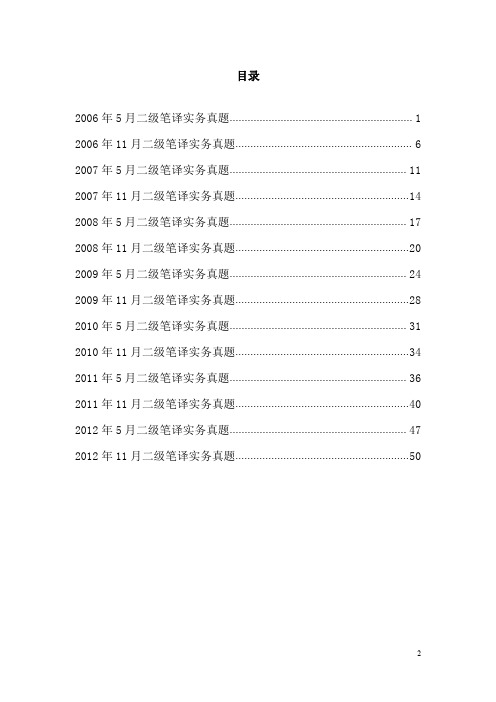
目录2006年5月二级笔译实务真题 (1)2006年11月二级笔译实务真题 (6)2007年5月二级笔译实务真题 (11)2007年11月二级笔译实务真题 (14)2008年5月二级笔译实务真题 (17)2008年11月二级笔译实务真题 (20)2009年5月二级笔译实务真题 (24)2009年11月二级笔译实务真题 (28)2010年5月二级笔译实务真题 (31)2010年11月二级笔译实务真题 (34)2011年5月二级笔译实务真题 (36)2011年11月二级笔译实务真题 (40)2012年5月二级笔译实务真题 (47)2012年11月二级笔译实务真题 (50)2006年5月二级笔译实务真题【英译汉必译题】For all the natural and man-made disasters of the past year,travelers seem more determined than ever to leave home.Never mind the tsunami devastation in Asia last December,the recent earthquake in Kashmir or the suicide bombings this year in London and Bali,among other places on or off the tourist trail.The number of leisure travelers visiting tourist destinations hit by trouble has in some cases bounced back to a level higher than before disaster struck."This new fast recovery of tourism we are observing is kind of strange,"said John Koldowski,director for the Strategic Intelligence Center of the Bangkok-based Pacific Asia Travel Association."It makes you think about the adage that any publicity is good publicity."It is still too soon to compile year-on-year statistics for the disasters of the past12 months,but travel industry experts say that the broad trends are already clear.Leisure travel is expected to increase by nearly5percent this year,according to the World Tourism and Travel Council.Tourism and travel now seem to bounce back faster and higher each time there is an event of this sort,"said Ufi Ibrahim,vice president of the London-based World Tourism and Travel Council.For London,where suicide bombers killed56and wounded700on July8,she said,"It was almost as if people who stayed away after the bomb attack then decided to come back twice."Early indicators show that the same holds true for other disaster-struck destinations.Statistics compiled by the Pacific Asia Travel Association,for example, show that monthly visitor arrivals in Sri Lanka,where the Dec.26,2004,tsunami left more than30,000people dead or missing,were higher than one year earlier for every month from March through August of this year.A case commonly cited by travel professionals as an early example of the trend is Bali,where202people were killed in bombings targeting Western tourists in October 2002.Visitor arrivals plunged to993,000for the year after the bombing,but bounced back to1.46million in2004,a level higher than the two years before the bomb, according to the Pacific Asia Travel Association.Even among Australians,who suffered the worst casualties in the Bali bombings, the number of Bali-bound visitors bounced back within two years to the highest level since1998,according the Pacific Asia Travel Association.Bali was hit again this year by suicide bombers who killed19people in explosions at three restaurants.Visits are also on the upswing to post-tsunami Thailand,where the giant waves killed5,400and left more than5,000missing.Although the tsunami killed more than500Swedes on the Thai resort island of Phuket,the largest number of any foreign nationality to die,Swedes are returning to the island in larger numbers than last year,according to My Travel Sweden,a Stockholm-based group that sends600,000tourists overseas annually and claims a28 percent market share for Sweden."We were confident that Thailand would eventually bounce back as a destination, but we didn"t think that this year it would come back even stronger than last year," said Joakim Eriksson,director of communication for My Travel Sweden."We were very surprised because we really expected a significant decline."Eriksson said My Travel now expects a5percent increase in visitors to both Thailand and Sri Lanka this season compared with the same season last year.This behavior is a sharp change from the patterns of the1990s,Eriksson said."During the first Gulf war we saw a sharp drop in travel as a whole,and the same after Sept.11,"Eriksson said."Now the main impact of terrorism or disasters is a change in destination."【英译汉二选一】【试题1】Freed by warming,waters once locked beneath ice are gnawing at coastal settlements around the Arctic Circle.In Bykovsky,a village of457on Russia's northeast coast,the shoreline is collapsing,creeping closer and closer to houses and tanks of heating oil,at a rate of 15to18feet a year."It is practically all ice-permafrost-and it is thawing."For the four million people who live north of the Arctic Circle,a changing climate presents new opportunities.But it also threatens their environment,their homes and,for those whose traditions rely on the ice-bound wilderness,the preservation of their culture.A push to develop the North,quickened by the melting of the Arctic seas,carries its own rewards and dangers for people in the region.The discovery of vast petroleum fields in the Barents and Kara Seas has raised fears of catastrophic accidents as ships loaded with oil and,soon,liquefied gas churn through the fisheries off Scandinavia, headed to markets in Europe and North nd that was untouched could betainted by pollution as generators,smokestacks and large vehicles sprout to support the growing energy industry.Coastal erosion is a problem in Alaska as well,forcing the United States to prepare to relocate several Inuit villages at a projected cost of$100million or more for each one.Across the Arctic,indigenous tribes with traditions shaped by centuries of living in extremes of cold and ice are noticing changes in weather and wildlife.They are trying to adapt,but it can be confounding.In Finnmark,Norway's northernmost province,the Arctic landscape unfolds in late winter as an endless snowy plateau,silent but for the cries of the reindeer and the occasional whine of a snowmobile herding them.A changing Arctic is felt there,too."The reindeer are becoming unhappy,"said Issat Eira,a31-year-old reindeer herder.Few countries rival Norway when it comes to protecting the environment and preserving indigenous customs.The state has lavished its oil wealth on the region,and Sami culture has enjoyed something of a renaissance.And yet no amount of government support can convince Mr.Eira that his livelihood,intractably entwined with the reindeer,is not about to change.Like a Texas cattleman,he keeps the size of his herd secret.But he said warmer temperatures in fall and spring were melting the top layers of snow,which then refreeze as ice, making it harder for his reindeer to dig through to the lichen they eat."The people who are making the decisions,they are living in the south and they are living in towns,"said Mr.Eira,sitting inside his home made of reindeer hides. "They don't mark the change of weather.It is only people who live in nature and get resources from nature who mark it."A push to develop the North,quickened by the melting of the Arctic seas,carries its own rewards and dangers for people in the region.The discovery of vast petroleum fields in the Barents and Kara Seas has raised fears of catastrophic accidents as ships loaded with oil and,soon,liquefied gas churn through the fisheries off Scandinavia, headed to markets in Europe and North nd that was untouched could be tainted by pollution as generators,smokestacks and large vehicles sprout to support the growing energy industry.【试题2】Some people call him“Guidone”—big rge in both physical stature and reputation,Guido Rossi,who took over as Telecom Italia's chairman on September 15th following the surprise resignation of Marco Tronchetti Provera,has stood outfrom the Italian business crowd for more than three decades.Mr.Rossi,who attended Harvard law school in the1950s and wrote a book on American bankruptcy law, made his name as a corporate lawyer keen on market rules and their enforcement.He has since worked in both private and public sectors,including stints in the Italian Senate and as one of the European Commission's group of company-law experts.As well as running a busy legal practice,he also has a reputation as a corporate troubleshooter and all-round Mr Fix-It,and is often called upon to clean up organisations in crisis.His role at Telecom Italia marks a return to the company he headed for ten months in1997,during its politically tricky and legally complex privatisation.Before that,Mr Rossi had been sent in to sort out Ferruzzi-Montedison,an agri-business and chemicals group,which had collapsed after magistrates uncovered tangentopoli (“bribesville”).Last year his legal scheming was crucial in ABN Amro's victorious bid for Banca Antonveneta.Most recently,he acted as special commissioner at Italy's football association,where he was drafted in to sort out the mess after a massive match-rigging scandal exploded earlier this year.Alas,his efforts to bleach football's dark stains produced the same meagre[4] results as his other efforts to get Italian business and finance to change its ways.“Like Italians when tangentopoli burst,fans wanted justice when the scandal broke;but enthusiasm for legality quickly waned,”sighs Francesco Saverio Borrelli,Milan's former chief prosecutor,who headed the city's assault on corruption during the1990s and was appointed by Mr Rossi to dig out football's dirt.The political muscle of the clubs prevented tough measures being taken against them,reflecting Italy's two-tier justice system in which the rich and powerful can do what they like.“Economic interests in football far outweigh sporting interests,”remarks Mr Borrelli.The rottenness in football shocked even the unshakeable Mr Rossi.“Football did not want rules,it just wanted me to solve its problems,”he says.Despairing of being able to change much,he resigned in September and turned his attention to Telecom Italia.【汉译英】【试题一】亚洲是我们共同的家园,亚洲的和平、稳定、发展关系到亚洲各国人民的共同命运。
翻译资格证CATTI历年真题

英汉翻译八大注意事项一、数字一般的规定是,对于纯粹属于计量或统计范畴的数值,无论原文是否使用阿拉伯数字,译文一般用阿拉伯数字。
例如:原文“654,321,000”,译文中照抄“654,321,000”即可;不能译为6亿5千4百32万1千。
原文“fifty million”,可译为“5 000万”;不能译为“五十百万”,或“50百万”。
对于万以上数字,中文一般以“万”和“亿”为单位;原文“half a billion,,,可译为“5亿”。
原文“five trucks”,可译为“5辆卡车”;原文“3-4 percent”,可译为“3%-4%”;原文“five percentage points”,可译为“5 个百分点”。
原文用英文数字或罗马数字表示的,除纯粹属于计量或统计范畴的数值的情况外,译文用汉字。
例如:原文“Chapter II”,可译为“第二章”,不能译为“第2章”;原文“Committee of Twenty-four”,可译为“二十四国委员会”,不能译为“24国委员会”;原文“Sixty-fourth Session”,可译为“第六十四届会议”,不能译为“第64届会议”。
在原文中,数字如作为词素构成固定的词、词组、惯用语、缩略语、具有修辞色彩的语句,以及邻近两个数字连用表示概数的情况,则译文中可使用汉字;整数一至十,如果不是出现在具有统计意义的一组数字中,可以用汉字,但要照顾到上下文,以便求得局部体例上的一致。
例如:原文“quarter”,应译为“四分之一”;原文“three to four people”,则译为“三四人”;原文“Third World”,可译为“第三世界”;原文“several thousand people”,则译为“几千人”;原文“five principles”,可译为“五项原则”;原文“four or five hundred”,可译为“四五百”;原文“well over sixty”,可译为“六十好几了(年龄)”,原文“50-odd years old”,可译为“五十出头”,原文“a little over 30 years old”,可译为“三十挂零”等等。
二级英语笔译试题及答案
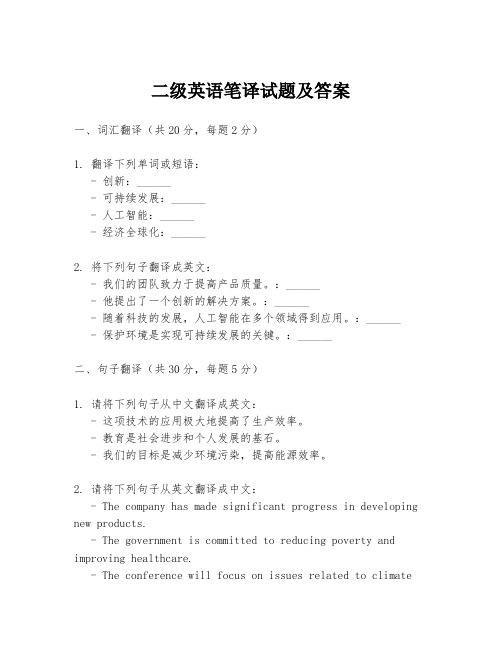
二级英语笔译试题及答案一、词汇翻译(共20分,每题2分)1. 翻译下列单词或短语:- 创新:______- 可持续发展:______- 人工智能:______- 经济全球化:______2. 将下列句子翻译成英文:- 我们的团队致力于提高产品质量。
:______- 他提出了一个创新的解决方案。
:______- 随着科技的发展,人工智能在多个领域得到应用。
:______- 保护环境是实现可持续发展的关键。
:______二、句子翻译(共30分,每题5分)1. 请将下列句子从中文翻译成英文:- 这项技术的应用极大地提高了生产效率。
- 教育是社会进步和个人发展的基石。
- 我们的目标是减少环境污染,提高能源效率。
2. 请将下列句子从英文翻译成中文:- The company has made significant progress in developing new products.- The government is committed to reducing poverty and improving healthcare.- The conference will focus on issues related to climatechange and environmental protection.三、段落翻译(共50分,每题10分)1. 将下列段落从中文翻译成英文:随着互联网的普及,人们获取信息的方式发生了巨大变化。
现在,我们可以通过各种在线平台快速获取所需的信息。
这不仅提高了工作效率,也丰富了我们的日常生活。
2. 将下列段落从英文翻译成中文:The advancement of technology has brought about a revolution in the way we communicate and interact with each other. Social media platforms have become an integral part of our daily lives, allowing us to stay connected with friends and family, regardless of the distance.四、答案一、词汇翻译1. 创新:innovation可持续发展:sustainable development人工智能:artificial intelligence经济全球化:economic globalization2. 我们的团队致力于提高产品质量。
翻译资格考试二级笔译真题及答案
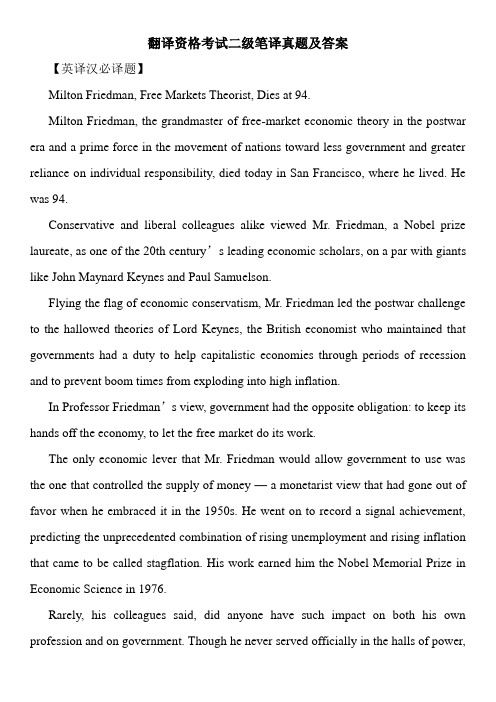
翻译资格考试二级笔译真题及答案【英译汉必译题】Milton Friedman, Free Markets Theorist, Dies at 94.Milton Friedman, the grandmaster of free-market economic theory in the postwar era and a prime force in the movement of nations toward less government and greater reliance on individual responsibility, died today in San Francisco, where he lived. He was 94.Conservative and liberal colleagues alike viewed Mr. Friedman, a Nobel prize laureate, as one of the 20th century’s leading economic scholars, on a par with giants like John Maynard Keynes and Paul Samuelson.Flying the flag of economic conservatism, Mr. Friedman led the postwar challenge to the hallowed theories of Lord Keynes, the British economist who maintained that governments had a duty to help capitalistic economies through periods of recession and to prevent boom times from exploding into high inflation.In Professor Friedman’s view, government had the opposite obligation: to keep its hands off the economy, to let the free market do its work.The only economic lever that Mr. Friedman would allow government to use was the one that controlled the supply of money — a monetarist view that had gone out of favor when he embraced it in the 1950s. He went on to record a signal achievement, predicting the unprecedented combination of rising unemployment and rising inflation that came to be called stagflation. His work earned him the Nobel Memorial Prize in Economic Science in 1976.Rarely, his colleagues said, did anyone have such impact on both his own profession and on government. Though he never served officially in the halls of power,he was always around them, as an adviser and theorist.“Among economic scholars, Milton Friedman had no peer,” Ben S. Bernanke, the Federal Reserve chairman, said t oday. “The direct and indirect influences of his thinking on contemporary monetary economics would be difficult to overstate.”Alan Greenspan, the former Federal Reserve chairman, said of Mr. Friedman in an interview on Tuesday. “From a longer-term point of view, it’s his academic achievements which will have lasting import. But I would not dismiss the profound impact he has already had on the American public’s view.”Mr. Friedman had a gift for communicating complicated ideas in simple and lucid ways, and it served him well as the author or co-author of more than a dozen books, as a columnist for Newsweek from 1966 to 1983 and even as the star of a public television series.【英译汉二选一】试题1Panama goes to polls on upgrade for canalPANAMA CITY: V oters were expected Sunday to approve the largest modernization project in the 92-year history of the Panama Canal, a $5.25 billion plan to expand the waterway to allow for larger ships while alleviating traffic problems.The government of President Martín Torrijos has billed the referendum as historic, saying the work would double the capacity of a canal already on pace to generate about $1.4 billion in revenue this year. Critics claim the expansion would benefit the canal’s customers more than Panamanians, and worry that costs could balloon, forcing this debt- ridden country to borrow even more.The project would build a third set of locks on the Pacific and Atlantic ends of thecanal by 2015, allowing it to handle modern container ships, cruise liners and tankers too large for its locks, which are 33 meters, or 108 feet, wide.The Panama Canal Authority, the autonomous government agency that runs the canal, says the project would be paid for by increasing tolls and would generate $6 billion in revenue by 2025.There is nothing Panamanians are more passionate about than the canal.“It’s incomparable in the hemisphere,” said Samuel Lewis Navarro, the country’s vice president and foreign secretary. “It’s in our heart, part of our soul.”Public opinion polls indicate that the plan would be approved overwhelmingly. Green and white signs throughout the country read “Yes for our children,” while tens of thousands of billboards and bumper stickers trumpet new jobs.“The canal needs you,” television and radio ads implore.“It will mean more boats, and that means more jobs,” said Damasco Polanco, who was herding cows on horseback in Nuevo Provedencia, on the banks of Lake Gatún, an artificial reservoir that supplies water to the canal.The canal employs 8,000 workers and the expansion is expected to generate as many as 40,000 new jobs. Unemployment in Panama is 9.5 percent, and 40 percent of the country lives in poverty.But critics fear that the expansion could cost nearly double the government’s estimate, as well as stoke corruption and uncontrolled debt.“The poor continue to suffer while the rich get richer,” said José Felix Castillo, 62, a high school teacher who was one of about 3,000 supporters who took to Panama City’s streets to protest the measure on Friday.Lewis Navarro noted that a portion of the revenue generated by each ton of cargothat passes through the waterway goes to education and social programs.“We aren’t talking about 40 percent poverty as a consequence of the canal,” he said. “It’s exactly the opposite.”【汉译英】【试题一】旅游是一项集观光、娱乐、健身为一体的愉快而美好的活动。
2017年5月翻译资格考题二级英语笔译实务试卷及答案
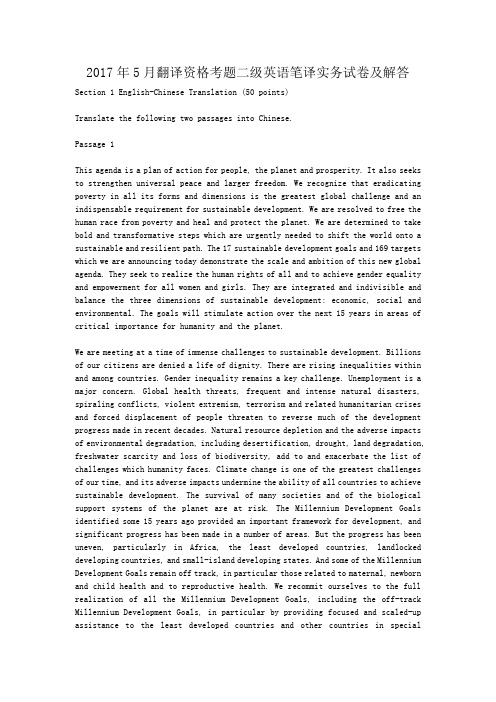
2017年5月翻译资格考题二级英语笔译实务试卷及解答Section 1 English-Chinese Translation (50 points)Translate the following two passages into Chinese.Passage 1This agenda is a plan of action for people, the planet and prosperity. It also seeks to strengthen universal peace and larger freedom. We recognize that eradicating poverty in all its forms and dimensions is the greatest global challenge and an indispensable requirement for sustainable development. We are resolved to free the human race from poverty and heal and protect the planet. We are determined to take bold and transformative steps which are urgently needed to shift the world onto a sustainable and resilient path. The 17 sustainable development goals and 169 targets which we are announcing today demonstrate the scale and ambition of this new global agenda. They seek to realize the human rights of all and to achieve gender equality and empowerment for all women and girls. They are integrated and indivisible and balance the three dimensions of sustainable development: economic, social and environmental. The goals will stimulate action over the next 15 years in areas of critical importance for humanity and the planet.We are meeting at a time of immense challenges to sustainable development. Billions of our citizens are denied a life of dignity. There are rising inequalities within and among countries. Gender inequality remains a key challenge. Unemployment is a major concern. Global health threats, frequent and intense natural disasters, spiraling conflicts, violent extremism, terrorism and related humanitarian crises and forced displacement of people threaten to reverse much of the development progress made in recent decades. Natural resource depletion and the adverse impacts of environmental degradation, including desertification, drought, land degradation, freshwater scarcity and loss of biodiversity, add to and exacerbate the list of challenges which humanity faces. Climate change is one of the greatest challenges of our time, and its adverse impacts undermine the ability of all countries to achieve sustainable development. The survival of many societies and of the biological support systems of the planet are at risk. The Millennium Development Goals identified some 15 years ago provided an important framework for development, and significant progress has been made in a number of areas. But the progress has been uneven, particularly in Africa, the least developed countries, landlocked developing countries, and small-island developing states. And some of the Millennium Development Goals remain off track, in particular those related to maternal, newborn and child health and to reproductive health. We recommit ourselves to the full realization of all the Millennium Development Goals, including the off-track Millennium Development Goals, in particular by providing focused and scaled-up assistance to the least developed countries and other countries in specialsituations, in line with relevant support programs. The new agenda builds on the existing Millennium Development Goals and seeks to complete what these did not achieve, particularly in reaching the most vulnerable countries.官方参照译文:本议程是为人类、地球与繁荣制订的行动计划。
200605-201005-CATTI二级笔译实务真题及答案(打印版)

2010年5月CATTI二级笔译综合能力测试完型填空原文以及答案When We Talk About Privacy——by Ruth Suli UrmanWhen we talk about privacy issues with teenagers, what are we really talking about? Most importantly, trust. It's only natural for adolescents growing into their teen years, to want some privacy, some alone time, where they can think about who they are becoming, who they want to be and perhaps, just to relax and be out of earshot of the rest of the world. Teens, like adults, work hard too. And when we consider how much socializing they are forced to do, when they attend school all day, sometimes they just want to come home, go into their room, close the door and just listen to the music of their choice. As adults, it helps to remember not to take these things personally.We also need to remember that teenagers can experience "bad" days, too. In giving them the space to be irritable or sad, without demanding that they put on a cheerful face and façade - as we certainly can't expect anything from them that we don't expect from ourselves! - we are honoring their feelings, as we honor our own feelings.Keeping journals, having private conversations with their friends on the phone, and wanting some alone time is a teen's way of becoming who they are. They are slipping into their bodies, their minds, and their distinct individualities. It helps to remember what it was like to be a teen: the writing we may not have wanted to show our parents, the conversations with friends about "crushes," the times that we wanted to listen to The Beatles when our parents only wanted to hear classical music.It is helpful to think about how we want to be treated, as an adult. Remember: respect is earned, not taken for granted. In order to expect our teenagers to be respectful of us, we must be their teachers and their guides, so that they can mirror our behavior. They will give us back what we are giving them, even without consciously thinking about it. What happens if they "hole" themselves up and we never see their lovely faces? As a beginning, in balancing their alone time, we can reach out and make the time to gather the family together, such as meal times, to create communication. This way our children don't end up living their lives behind closed bedroom doors (where we miss out on their childhood years).Coming together as a family is important, too. There is an immense feeling of satisfaction knowing that we are not strangers to our children, and they are not strangers to us. If there is any concern about what they are doing when you are not with them, find a good time and place where they are comfortable (and you are feeling relaxed about talking) and tell them about your concerns. Life is a series of balances, and in the instance of privacy, we can balance that too. Let them know in a loving way how much you care and perhaps share one of your own teenage stories.In teaching them to balance their privacy needs, there is nothing wrong with asking them questions about where they are going, and expecting them to honor our house rules about curfew, etc. We are still the parents and if we decide we need more information about their friends, by all means, take notes on where they are headed off to, or better yet, offer to be a part of their lives, as much as they are willing to let you in: personally meet their friends' parents; become active in their school. It's a great way to find out about their friendships-which are invaluable to teens, and to foster a close relationship with our teenagers - especially if we come from a place of love and caring and not from a sense of snooping or spying.实务英译汉-必译题In the European Union, carrots must be firm but not woody, cucumbers must not be too curved and celery has to be free of any type of cavity. This was the law, one that banned overly curved, extra-knobbly or oddly shaped produce from supermarket shelves.But in a victory for opponents of European regulation, 100 pages of legislation determining the size, shape and texture of fruit and vegetables have been torn up. On Wednesday, EU officials agreed to axe rules laying down standards for 26 products, from peas to plums.In doing so, the authorities hope they have killed off regulations routinely used by critics - most notably in the British media - to ridicule the meddling tendencies of the EU.After years of news stories about the permitted angle or curvature of fruit and vegetables, the decision Wednesday also coincided with the rising price of commodities. With the cost of the weekly supermarket visit on the rise, it has become increasingly hard to defend the act of throwing away food just because it looks strange.Beginning in July next year, when the changes go into force, standards on the 26 products will disappear altogether. Shoppers will the be able to chose their produce whatever its appearance.Under a compromise reached with national governments, many of which opposed the changes, standards will remain for 10 types of fruit and vegetables, including apples, citrus fruit, peaches, pears, strawberries and tomatoes.But those in this category that do not meet European norms will still be allowed onto the market, providing they are marked as being substandard or intended for cooking or processing."This marks a new dawn for the curvy cucumber and the knobbly carrot," said Mariann Fischer Boel, European commissioner for agriculture, who argued that regulations were better left to market operators."In these days of high food prices and general economic difficulties," Fischer Boel added, "consumers should be able to choose from the widest range of products possible. It makes no sense to throw perfectly good products away, just because they are the 'wrong' shape."That sentiment was not shared by 16 of the EU's 27 nations - including Greece, France, the Czech Republic, Spain, Italy and Poland - which tried to block the changes at a meeting of the Agricultural Management Committee.Several worried that the abolition of standards would lead to the creation of national ones, said one official speaking on condition of anonymity because of the sensitivity of the discussions.Copa-Cogeca, which represents European agricultural trade unions and cooperatives, also criticized the changes. "We fear that the absence of EU standards will lead member states to establish national standards and that private standards will proliferate," said its secretary general, Pekka Pesonen.But the decision to scale back on standards will be welcomed by euro-skeptics who have long pilloried the EU executive's interest in intrusive regulation.One such controversy revolved around the correct degree of bend in bananas - a type of fruit not covered by the Wednesday ruling.In fact, there is no practical regulation on the issue. Commission Regulation (EC) 2257/94 says that bananas must be "free from malformation or abnormal curvature," though Class 1 bananas can have "slight defects of shape" and Class 2 bananas can have full "defects of shape."By contrast, the curvature of cucumbers has been a preoccupation of European officials. Commission Regulation (EEC) No 1677/88 states that Class I and "Extra class" cucumbers are allowed a bend of 10 millimeters per 10 centimeters of length. Class II cucumbers can bend twice as much.It also says cucumbers must be fresh in appearance, firm, clean and practically free of any visible foreign matter or pests, free of bitter taste and of any foreign smell.Such restrictions will disappear next year, and about 100 pages of rules and regulations will go as well, a move welcomed by Neil Parish, chairman of the European Parliament's agriculture committee. "Food is food, no matter what it looks like," Parish said. "To stop stores selling perfectly decent food during a food crisis is morally unjustifiable. Credit should be given to the EU agriculture commissioner for pushing through these proposals. Consumers care about the taste and quality of food, not how it looks."参考译文In the European Union, carrots must be firm but not woody, cucumbers must not be too curved and celery has to be free of any type of cavity. This was the law, one that banned overly curved, extra-knobbly or oddly shaped produce from supermarket shelves.在欧盟,市场出售的胡萝卜必须脆而不糠,黄瓜也不能太弯,芹菜一点空心都不能有。
2017年5月CATTI英语二级笔译真题及汉译英答案
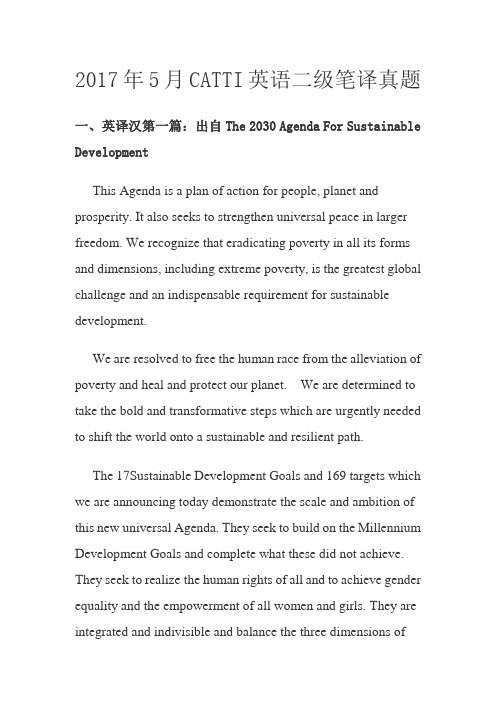
2017年5月CATTI英语二级笔译真题一、英译汉第一篇:出自The 2030 Agenda For Sustainable DevelopmentThis Agenda is a plan of action for people, planet and prosperity. It also seeks to strengthen universal peace in larger freedom. We recognize that eradicating poverty in all its forms and dimensions, including extreme poverty, is the greatest global challenge and an indispensable requirement for sustainable development.We are resolved to free the human race from the alleviation of poverty and heal and protect our planet.We are determined to take the bold and transformative steps which are urgently needed to shift the world onto a sustainable and resilient path.The 17Sustainable Development Goals and 169 targets which we are announcing today demonstrate the scale and ambition of this new universal Agenda. They seek to build on the Millennium Development Goals and complete what these did not achieve. They seek to realize the human rights of all and to achieve gender equality and the empowerment of all women and girls. They are integrated and indivisible and balance the three dimensions ofsustainable development: the economic, social and environmental.We are meeting at a time of immense challenges to sustainable development.Billions of our citizens continue to live in poverty and are denied a life of dignity.There are rising inequalities within and among countries. Gender inequality remains a key challenge. Unemployment, particularly youth unemployment, is a major concern. Global health threats, more frequent and intense natural disasters, spiraling conflict, violent extremism, terrorism and related humanitarian crises and forced displacement of people threaten to reverse much of the development progress made in recent decades.Natural resource depletion and adverse impacts of environmental degradation, including desertification, drought, land degradation,freshwater scarcity and loss of biodiversity, add to and exacerbate the list of challenges which humanityfaces.Climate change is one of the greatest challenges of our time and its adverse impacts undermine the ability of all countries to achieve sustainable development.The Millennium Development Goals were agreed 15 years ago provided an important framework for development andsignificant progress has been made in a number of areas. But the progress has been uneven, particularly in Africa, least developed countries, landlocked developing countries, and small island developing States, and some of the Millennium Development Goals remain off-track,in particular those related to maternal, newborn and child health and to reproductive health. We recommit ourselves to the full realization of all the Millennium Development Goals, including the off-track Millennium Development Goals, in particular by providing focused and scaled-up assistance to least developed countries and other countries in special situations, in line with relevant support programs. The new Agenda builds on the Millennium Development Goals and seeks to complete what these did not achieve, particularly in reaching the most vulnerable countries.二、英译汉第二篇:出自2010年EconomistEntrepreneurs in Silicon Valley, only half-jokingly, call it the URL strategy.The three letters usually stand for Uniform Resource Locator—the unique address of any file that is accessible via the internet. But in the world of internet start-ups, URL has another meaning: Ubiquity first, Revenue Later. This pretty much describes the strategy of most big online socialnetworks, which over the past few years have concentrated on piling on users rather than worrying about profits.That has allowed them to build huge followings, but it has also raised a big question-mark over their ability to make money from the audiences they have put together.At issue is whether the social-networking industry can come up with a wildly successful form of advertising in the same way that Google has been able to make billions of dollars from the targeted ads that run alongside the search results it serves up. Without such a formula,runs the argument, social networks such as Facebook will never amount to much.Doubters claim that the networks face two big handicaps. The first is that people logged into social-networking sites are there to hang out with their friends, so they will pay no attention to ads. The second is that because the sites let users generate their own content, they will find it hard to attract advertisers because brands will not want to take the risk of appearing alongside examples of profanity,obscenity or nudity—or all three at once.But the broader outlook for networking sites is more encouraging. One reason is that advertisers are being drawn to the leading sites by their sheer scale. Facebook's audience isbigger than any TV network that has ever existed on the face of the earth. Another thing that has attracted companies is the networks' ability to target ads with laser-like precision, thanks to the data they hold on their users' ages, gender, interests and so forth. Although there are still lingering concerns about brands appearing next to racy content, firms seem more willing to run this risk now that the networks' advertising proposition has become more compelling.In addition to advertising-driven business model, networks are already making healthy profits from sales of games and virtual goods. The beauty of this business for social networks is that the cost of producing and storing virtual inventory is minimal. Moreover, because these are closed markets, networks can fix prices at levels that generate fat margins. To some, the notion that big money can be made from selling make-believe items may seem bizarre. But the practice replicates the physical presents that people give to one another to cement relationships in the real world.三、汉译英第一篇:出自中国五矿集团公司介绍本公司是全球最大最强的冶金建设运营服务商,拥有24万在职员工,资产规模超7000亿元,境外机构、资源项目与承建工程遍布全球60多个国家和地区。
CATTI笔译综合能力二级翻译真题2006-2013
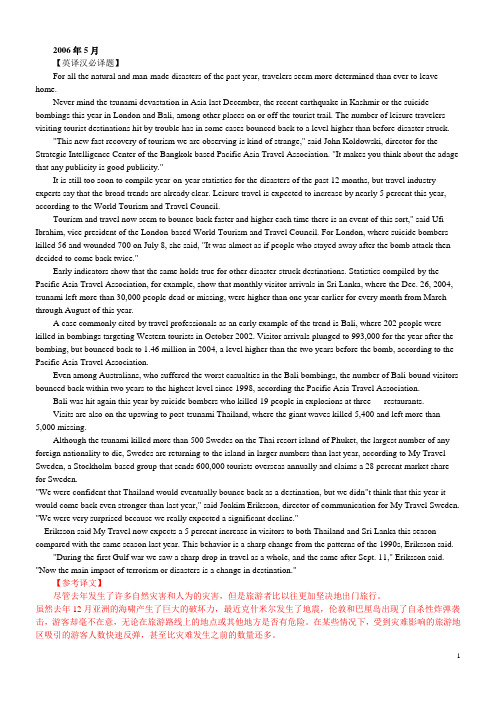
2006年5月【英译汉必译题】For all the natural and man-made disasters of the past year, travelers seem more determined than ever to leave home.Never mind the tsunami devastation in Asia last December, the recent earthquake in Kashmir or the suicide bombings this year in London and Bali, among other places on or off the tourist trail. The number of leisure travelers visiting tourist destinations hit by trouble has in some cases bounced back to a level higher than before disaster struck."This new fast recovery of tourism we are observing is kind of strange," said John Koldowski, director for the Strategic Intelligence Center of the Bangkok-based Pacific Asia Travel Association. "It makes you think about the adage that any publicity is good publicity."It is still too soon to compile year-on-year statistics for the disasters of the past 12 months, but travel industry experts say that the broad trends are already clear. Leisure travel is expected to increase by nearly 5 percent this year, according to the World Tourism and Travel Council.Tourism and travel now seem to bounce back faster and higher each time there is an event of this sort," said Ufi Ibrahim, vice president of the London-based World Tourism and Travel Council. For London, where suicide bombers killed 56 and wounded 700 on July 8, she said, "It was almost as if people who stayed away after the bomb attack then decided to come back twice."Early indicators show that the same holds true for other disaster-struck destinations. Statistics compiled by the Pacific Asia Travel Association, for example, show that monthly visitor arrivals in Sri Lanka, where the Dec. 26, 2004, tsunami left more than 30,000 people dead or missing, were higher than one year earlier for every month from March through August of this year.A case commonly cited by travel professionals as an early example of the trend is Bali, where 202 people were killed in bombings targeting Western tourists in October 2002. Visitor arrivals plunged to 993,000 for the year after the bombing, but bounced back to 1.46 million in 2004, a level higher than the two years before the bomb, according to the Pacific Asia Travel Association.Even among Australians, who suffered the worst casualties in the Bali bombings, the number of Bali-bound visitors bounced back within two years to the highest level since 1998, according the Pacific Asia Travel Association.Bali was hit again this year by suicide bombers who killed 19 people in explosions at three restaurants.Visits are also on the upswing to post-tsunami Thailand, where the giant waves killed 5,400 and left more than5,000 missing.Although the tsunami killed more than 500 Swedes on the Thai resort island of Phuket, the largest number of any foreign nationality to die, Swedes are returning to the island in larger numbers than last year, according to My Travel Sweden, a Stockholm-based group that sends 600,000 tourists overseas annually and claims a 28 percent market share for Sweden."We were confident that Thailand would eventually bounce back as a destination, but we didn"t think that this year it would come back even stronger than last year," said Joakim Eriksson, director of communication for My Travel Sweden. "We were very surprised because we really expected a significant decline."Eriksson said My Travel now expects a 5 percent increase in visitors to both Thailand and Sri Lanka this season compared with the same season last year. This behavior is a sharp change from the patterns of the 1990s, Eriksson said."During the first Gulf war we saw a sharp drop in travel as a whole, and the same after Sept. 11," Eriksson said. "Now the main impact of terrorism or disasters is a change in destination."【参考译文】尽管去年发生了许多自然灾害和人为的灾害,但是旅游者比以往更加坚决地出门旅行。
2017年上半年笔译二级综合能力真题试卷(题后含答案及解析)
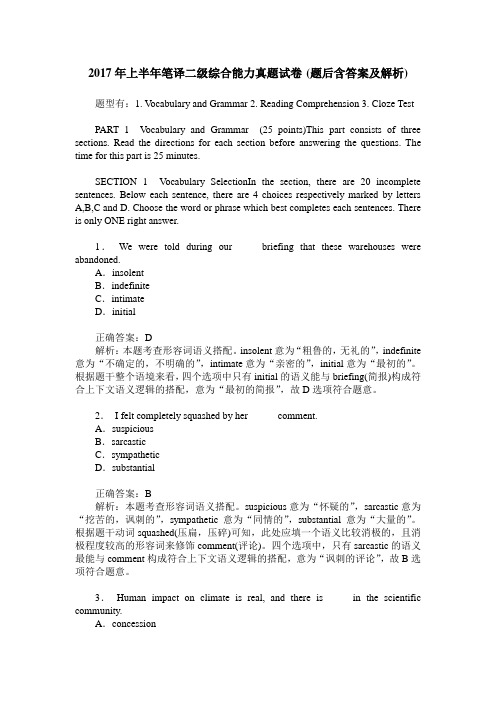
2017年上半年笔译二级综合能力真题试卷(题后含答案及解析) 题型有:1. V ocabulary and Grammar 2. Reading Comprehension 3. Cloze TestPART 1 V ocabulary and Grammar (25 points)This part consists of three sections. Read the directions for each section before answering the questions. The time for this part is 25 minutes.SECTION 1 V ocabulary SelectionIn the section, there are 20 incomplete sentences. Below each sentence, there are 4 choices respectively marked by letters A,B,C and D. Choose the word or phrase which best completes each sentences. There is only ONE right answer.1.We were told during our______briefing that these warehouses were abandoned.A.insolentB.indefiniteC.intimateD.initial正确答案:D解析:本题考查形容词语义搭配。
insolent意为“粗鲁的,无礼的”,indefinite 意为“不确定的,不明确的”,intimate意为“亲密的”,initial意为“最初的”。
根据题干整个语境来看,四个选项中只有initial的语义能与briefing(简报)构成符合上下文语义逻辑的搭配,意为“最初的简报”,故D选项符合题意。
2006年05月CATTI二级口译实务真题
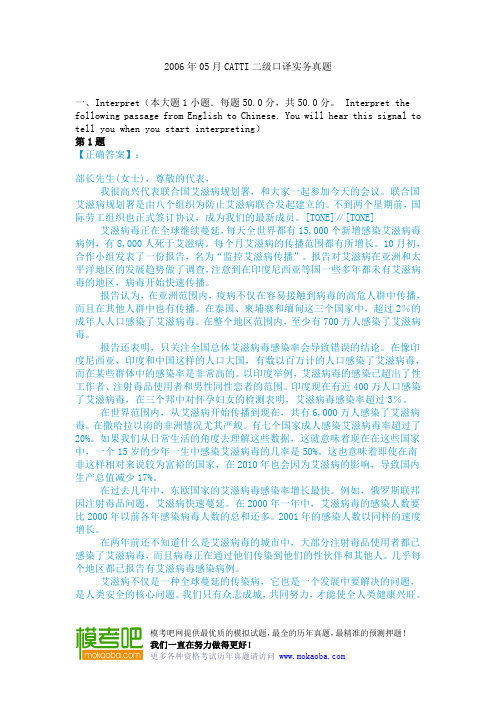
2006年05月CATTI二级口译实务真题一、Interpret(本大题1小题.每题50.0分,共50.0分。
Interpret the following passage from English to Chinese. You will hear this signal to tell you when you start interpreting)第1题【正确答案】:部长先生(女士),尊敬的代表,我很高兴代表联合国艾滋病规划署,和大家一起参加今天的会议。
联合国艾滋病规划署是由八个组织为防止艾滋病联合发起建立的。
不到两个星期前,国际劳工组织也正式签订协议,成为我们的最新成员。
[TONE]∥[TONE] 艾滋病毒正在全球继续蔓延,每天全世界都有15,000个新增感染艾滋病毒病例,有8,000人死于艾滋病。
每个月艾滋病的传播范围都有所增长。
10月初,合作小组发表了一份报告,名为“监控艾滋病传播”。
报告对艾滋病在亚洲和太平洋地区的发展趋势做了调查,注意到在印度尼西亚等国一些多年都未有艾滋病毒的地区,病毒开始快速传播。
报告认为,在亚洲范围内,疫病不仅在容易接触到病毒的高危人群中传播,而且在其他人群中也有传播。
在泰国、柬埔寨和缅甸这三个国家中,超过2%的成年人人口感染了艾滋病毒。
在整个地区范围内,至少有700万人感染了艾滋病毒。
报告还表明,只关注全国总体艾滋病毒感染率会导致错误的结论。
在像印度尼西亚、印度和中国这样的人口大国,有数以百万计的人口感染了艾滋病毒,而在某些群体中的感染率是非常高的。
以印度举例,艾滋病毒的感染已超出了性工作者、注射毒品使用者和男性同性恋者的范围。
印度现在有近400万人口感染了艾滋病毒,在三个邦中对怀孕妇女的检测表明,艾滋病毒感染率超过3%。
在世界范围内,从艾滋病开始传播到现在,共有6,000万人感染了艾滋病毒。
在撒哈拉以南的非洲情况尤其严峻。
有七个国家成人感染艾滋病毒率超过了20%。
二笔翻译真题

2003年12月Part A Compulsory Translation(必译题)(20 points)中华民族历来尊重人的尊严和价值。
还在遥远的古代,我们的先人就已提出“民为贵”的思想,认为“天生万物,唯人为贵”,一切社会的发展和进步,都取决于人的发展和进步,取决于人的尊严的维护和价值的发挥。
中国共产党领导人民进行革命、建设和改革,就是要实现全中国人民广泛的自由、民主和人权。
今天中国所焕发出来的巨大活力,是中国人民拥有广泛自由、民主的生动写照。
中国在公元一世纪人口就已达到过六千万左右,众多人口的衣食住行,几千年来一直是中国历代政府所要解决的首要人权问题。
今天的中国是一个有十二亿多人口的发展中大国,仍然必须首先保障最广大人民的生存权和发展权,不然一切其他权利都无从谈起。
中国确保十二亿多人的生存权和发展权,这是对世界人权进步事业的重大贡献。
Part B Choice of Two Translation (二选一题)(20 points)Topic 1(选题一)艾滋病艾滋病是一种威胁生命的疾病,它侵袭人体内的自然免疫系统,破坏人体的自卫能力。
艾滋病本身并不致命,但是,由于人体的免疫系统遭到破坏,病人几乎没有能力低于其他许多疾病的侵袭,例如,肺炎、癌症、致盲性疾病和精神错乱。
艾滋病毒存在于人的体液中。
这种病毒可以通过性生活或共用静脉注射器传播,也可以通过血制品传播,并且可以从患艾滋病的孕妇身上传播给她的妊娠婴儿。
有关艾滋病传播的许多说法是错误的。
与艾滋病患者一起工作或上学不会传染上艾滋病,触摸他们用过的饮水杯或其他东西也不会传染上艾滋病。
专家们说:没有人因为与艾滋病患者一起生活、照料艾滋病患者或触摸艾滋病患者而染上艾滋病。
Topic 2 (选题二)时间之谜如果你能够看懂时钟,你就可以知道一天的时间。
但是谁也不知道,时间本身究竟是什么。
时间是看不到、摸不着、听不见的,我们只能记录时间消逝的办法才知道时间的存在。
2006年5、11月 翻译资格考试二级笔译真题
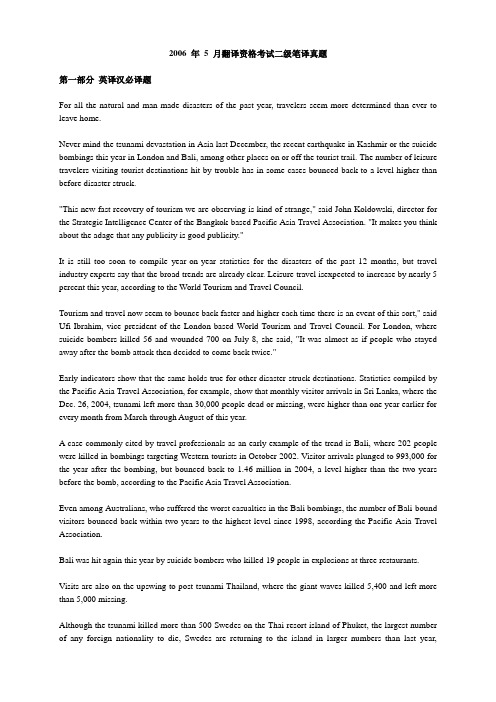
2006 年5 月翻译资格考试二级笔译真题第一部分英译汉必译题For all the natural and man-made disasters of the past year, travelers seem more determined than ever to leave home.Never mind the tsunami devastation in Asia last December, the recent earthquake in Kashmir or the suicide bombings this year in London and Bali, among other places on or off the tourist trail. The number of leisure travelers visiting tourist destinations hit by trouble has in some cases bounced back to a level higher than before disaster struck."This new fast recovery of tourism we are observing is kind of strange," said John Koldowski, director for the Strategic Intelligence Center of the Bangkok-based Pacific Asia Travel Association. "It makes you think about the adage that any publicity is good publicity."It is still too soon to compile year-on-year statistics for the disasters of the past 12 months, but travel industry experts say that the broad trends are already clear. Leisure travel isexpected to increase by nearly 5 percent this year, according to the World Tourism and Travel Council.Tourism and travel now seem to bounce back faster and higher each time there is an event of this sort," said Ufi Ibrahim, vice president of the London-based World Tourism and Travel Council. For London, where suicide bombers killed 56 and wounded 700 on July 8, she said, "It was almost as if people who stayed away after the bomb attack then decided to come back twice."Early indicators show that the same holds true for other disaster-struck destinations. Statistics compiled by the Pacific Asia Travel Association, for example, show that monthly visitor arrivals in Sri Lanka, where the Dec. 26, 2004, tsunami left more than 30,000 people dead or missing, were higher than one year earlier for every month from March through August of this year.A case commonly cited by travel professionals as an early example of the trend is Bali, where 202 people were killed in bombings targeting Western tourists in October 2002. Visitor arrivals plunged to 993,000 for the year after the bombing, but bounced back to 1.46 million in 2004, a level higher than the two years before the bomb, according to the Pacific Asia Travel Association.Even among Australians, who suffered the worst casualties in the Bali bombings, the number of Bali-bound visitors bounced back within two years to the highest level since 1998, according the Pacific Asia Travel Association.Bali was hit again this year by suicide bombers who killed 19 people in explosions at three restaurants.Visits are also on the upswing to post-tsunami Thailand, where the giant waves killed 5,400 and left more than 5,000 missing.Although the tsunami killed more than 500 Swedes on the Thai resort island of Phuket, the largest number of any foreign nationality to die, Swedes are returning to the island in larger numbers than last year,according to My Travel Sweden, a Stockholm-based group that sends600,000 tourists overseas annually and claims a 28 percent market share for Sweden."We were confident that Thailand would eventually bounce back as a destination, but we didn"t think that this year it would come back even stronger than last year," said Joakim Eriksson, director of communication for My Travel Sweden. "We were very surprised because we really expected a significant decline."Eriksson said My Travel now expects a 5 percent increase in visitors to both Thailand and Sri Lanka this season compared with the same season last year. This behavior is a sharp change from the patterns of the 1990s, Eriksson said."During the first Gulf war we saw a sharp drop in travel as a whole, and the same after Sept. 11," Eriksson said. "Now the main impact of terrorism or disasters is a change in destination."韩老师参考译文:尽管过去的一年天灾人祸不断,但这丝毫没有影响人们出游的兴致,出游意愿空前高涨。
2017年下半年11月全国翻译专业资格(水平)考试英语二级笔译综合能力真题(官方原版CATTI)

2017年11月全国翻译专业资格(水平)考试英语二级《笔译综合能力》试题Section1: Vocabulary and Grammar (60points)This section consists of 3 parts. Read the directions for each part before answering the questions.Part 1 Vocabulary SelectionIn this part , there are 20 incomplete sentences. Below each sentence, there are 4 choices marked by letters A, B ,C and D respectively. Choose the word which best completes each sentence. There is only ONE right answer. Blacken the corresponding letter as required on your machine-scoring ANSWER SHEET.1. In significant parts of Eurasia, the middle centuries of the first millennium a significant transition in human cultural history.A. defineB. markC. identifyD. specify2. It can sometimes feel like the world is very noisy—from planes arching loudly through the sky to the buzz of your cellphone.A. unavailingB. unassumingC. unconvincingD. unceasing3. A study commissioned by the Australian government found that women are partially blamed for the they experience, while the same behavior is considered a “tire of passage” for men.A. abandonmentB. absurdityC. accidentD. aggression4. The aim of this book is to foster good social work practice with the elderly and their families, and the first chapter sets out to clarify our understanding of the elderly in relation to their families.A. vigilantB. vehementC. venomousD. vulnerable5. The new creation has grown out of an attempt to two different tendencies, one in psychology and the other in physics, although at first sight they might seem inconsistent.A. complicateB. interchangeC. substituteD. harmonize6. The stories concerned ordinary people doing ordinary things with just a bit of inner ,and featured an omniscient narrator who provided the precise details of almost everything.A. unrestB. uneaseC. unbeliefD. uncertainty7. Nowadays we can see numerous foreign films and TV programs in and many other imported products dominating our markets.A. bringingB. settlingC. pouringD. growing8. Sub-Saharan Africa and Southeast Asia are most at risk from bat viruses humans and causing new diseases that could lead to deadly outbreaks.A. vaultingB. bouncingC. attackingD. hurdling9. Poland is somewhat a new destination for Chinese tourists, and Warsaw, the capital city, is an important business center with night life and elegant dining.A. sophisticatedB. sluggishC. sloppyD. solitary10. In the 1990s,a Chinese ,using yak and mule trains, spotted these Yunnan snub-nosed monkeys, living quietly among the trees, cut off from the world by peaks 22,000 feet high.A. excursionB. explorationC. expeditionD. experiment11. Instead of publishing in Science or Nature, the journals in which major new human fossil finds are typically announced, the authors unveiled their discovery in an open-online journal Elife.。
CATTI笔译综合能力二级翻译真题2006-2017
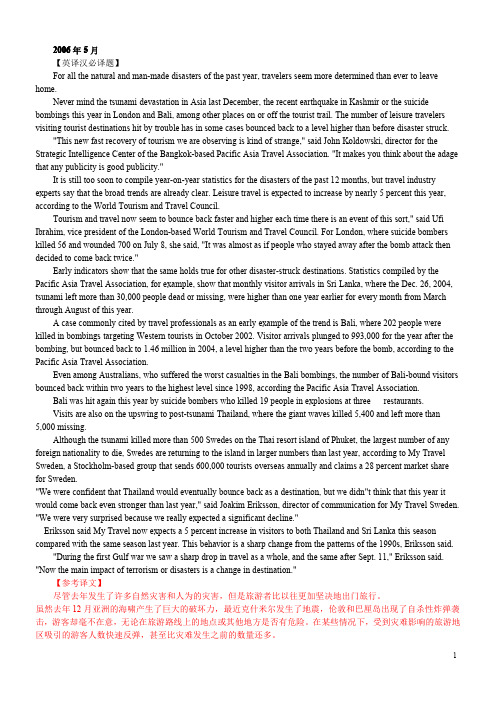
2006年5月【英译汉必译题】For all the natural and man-made disasters of the past year,travelers seem more determined than ever to leave home.Never mind the tsunami devastation in Asia last December,the recent earthquake in Kashmir or the suicide bombings this year in London and Bali,among other places on or off the tourist trail.The number of leisure travelers visiting tourist destinations hit by trouble has in some cases bounced back to a level higher than before disaster struck."This new fast recovery of tourism we are observing is kind of strange,"said John Koldowski,director for the Strategic Intelligence Center of the Bangkok-based Pacific Asia Travel Association."It makes you think about the adage that any publicity is good publicity."It is still too soon to compile year-on-year statistics for the disasters of the past12months,but travel industry experts say that the broad trends are already clear.Leisure travel is expected to increase by nearly5percent this year, according to the World Tourism and Travel Council.Tourism and travel now seem to bounce back faster and higher each time there is an event of this sort,"said Ufi Ibrahim,vice president of the London-based World Tourism and Travel Council.For London,where suicide bombers killed56and wounded700on July8,she said,"It was almost as if people who stayed away after the bomb attack then decided to come back twice."Early indicators show that the same holds true for other disaster-struck destinations.Statistics compiled by the Pacific Asia Travel Association,for example,show that monthly visitor arrivals in Sri Lanka,where the Dec.26,2004, tsunami left more than30,000people dead or missing,were higher than one year earlier for every month from March through August of this year.A case commonly cited by travel professionals as an early example of the trend is Bali,where202people were killed in bombings targeting Western tourists in October2002.Visitor arrivals plunged to993,000for the year after the bombing,but bounced back to1.46million in2004,a level higher than the two years before the bomb,according to the Pacific Asia Travel Association.Even among Australians,who suffered the worst casualties in the Bali bombings,the number of Bali-bound visitors bounced back within two years to the highest level since1998,according the Pacific Asia Travel Association.Bali was hit again this year by suicide bombers who killed19people in explosions at three restaurants.Visits are also on the upswing to post-tsunami Thailand,where the giant waves killed5,400and left more than5,000missing.Although the tsunami killed more than500Swedes on the Thai resort island of Phuket,the largest number of any foreign nationality to die,Swedes are returning to the island in larger numbers than last year,according to My Travel Sweden,a Stockholm-based group that sends600,000tourists overseas annually and claims a28percent market share for Sweden."We were confident that Thailand would eventually bounce back as a destination,but we didn"t think that this year it would come back even stronger than last year,"said Joakim Eriksson,director of communication for My Travel Sweden. "We were very surprised because we really expected a significant decline."Eriksson said My Travel now expects a5percent increase in visitors to both Thailand and Sri Lanka this season compared with the same season last year.This behavior is a sharp change from the patterns of the1990s,Eriksson said."During the first Gulf war we saw a sharp drop in travel as a whole,and the same after Sept.11,"Eriksson said. "Now the main impact of terrorism or disasters is a change in destination."【参考译文】尽管去年发生了许多自然灾害和人为的灾害,但是旅游者比以往更加坚决地出门旅行。
catti二级笔译综合能力试题精选及答案解析
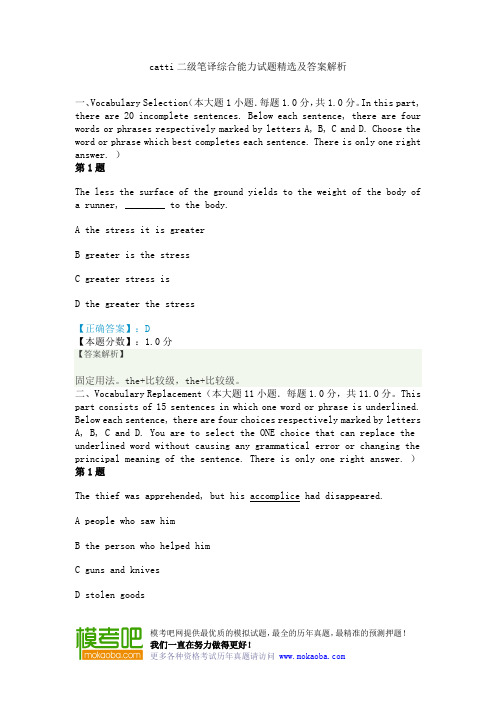
catti二级笔译综合能力试题精选及答案解析一、Vocabulary Selection(本大题1小题.每题1.0分,共1.0分。
In this part, there are 20 incomplete sentences. Below each sentence, there are four words or phrases respectively marked by letters A, B, C and D. Choose the word or phrase which best completes each sentence. There is only one right answer. )第1题The less the surface of the ground yields to the weight of the body of a runner, ________ to the body.A the stress it is greaterB greater is the stressC greater stress isD the greater the stress【正确答案】:D【本题分数】:1.0分【答案解析】固定用法。
the+比较级,the+比较级。
二、Vocabulary Replacement(本大题11小题.每题1.0分,共11.0分。
This part consists of 15 sentences in which one word or phrase is underlined. Below each sentence, there are four choices respectively marked by letters A, B, C and D. You are to select the ONE choice that can replace the underlined word without causing any grammatical error or changing the principal meaning of the sentence. There is only one right answer. )第1题The thief was apprehended, but his accomplice had disappeared.A people who saw himB the person who helped himC guns and knivesD stolen goods模考吧网提供最优质的模拟试题,最全的历年真题,最精准的预测押题!【正确答案】:B【本题分数】:1.0分【答案解析】名词辨析。
- 1、下载文档前请自行甄别文档内容的完整性,平台不提供额外的编辑、内容补充、找答案等附加服务。
- 2、"仅部分预览"的文档,不可在线预览部分如存在完整性等问题,可反馈申请退款(可完整预览的文档不适用该条件!)。
- 3、如文档侵犯您的权益,请联系客服反馈,我们会尽快为您处理(人工客服工作时间:9:00-18:30)。
CATTI二级笔译历年真题以及答案英汉翻译八大注意事项陈炳发全国翻译专业资格(水平)考试英语专家委员会委员有幸多次参与国家人事部组织、外文局实施并管理的全国翻译资格(水平)考试的阅卷、质检工作,我发现,一些考生翻译水平还是不错的,但对于翻译的基本常识缺乏了解,不知道如何规范地处理数字、人名、地名、机构名、缩略语以及其他问题,因而或多或少地影响了个人的成绩。
以下是我收集整理的一些考试中常见的“雷区”,可能对考生提高考试成绩有所助益。
一、数字关于数字用法的问题,国家主管部门已有具体规定,各翻译出版机构以及一些国际组织也有自己的专门规定。
有志于从事翻译职业的人应该对这些有起码的了解。
一般的规定是,对于纯粹属于计量或统计范畴的数值,无论原文是否使用阿拉伯数字,译文一般用阿拉伯数字。
例如:原文“654,321,000”,译文中照抄“654,321,000”即可;不能译为6亿5千4百32万1千。
原文“fifty million”,可译为“5 000万”;不能译为“五十百万”,或“50百万”。
对于万以上数字,中文一般以“万”和“亿”为单位;原文“half a billion”,可译为“5亿”。
原文“five trucks”,可译为“5辆卡车”;原文“3-4 percent”,可译为“3%-4%”;原文“five percentage points”,可译为“5个百分点”。
原文用英文数字或罗马数字表示的,除纯粹属于计量或统计范畴的数值的情况外,译文用汉字。
例如:原文“Chapter II”,可译为“第二章”,不能译为“第2章”;原文“Committee of Twenty-four”,可译为“二十四国委员会”,不能译为“24国委员会”;原文“Sixty-fourth Session”,可译为“第六十四届会议”,不能译为“第64届会议”。
在原文中,数字如作为词素构成固定的词、词组、惯用语、缩略语、具有修辞色彩的语句,以及邻近两个数字连用表示概数的情况,则译文中可使用汉字;整数一至十,如果不是出现在具有统计意义的一组数字中,可以用汉字,但要照顾到上下文,以便求得局部体例上的一致。
例如:原文“quarter”,应译为“四分之一”;原文“three to four people”,则译为“三四人”;原文“Third World”,可译为“第三世界”;原文“several thousand people”,则译为“几千人”;原文“five principles”,可译为“五项原则”;原文“four or five hundred”,可译为“四五百”;原文“well over sixty”,可译为“六十好几了(年龄)”, 原文“50-odd years old”,可译为“五十出头”, 原文“a little over 30 years old”,可译为“三十挂零”等等。
对于数字的翻译还可以做出许多规定,但对于翻译(水平)考试而言,掌握以上三点就基本可以了。
对于不规范的数字表述,诸如“6亿5千4百32万1千”之类,阅卷老师都是要酌情扣分的。
二、人名问题除另有特别规定外,对于原文中的人名一般都是要求翻译的,翻译时可以借助外文词典、人名词典或其他工具。
在考试中,考生应该力争将人名准确地翻译出来,尤其是一些国际上较为著名的人物,例如联合国秘书长、几个主要大国的国家元首或政府首脑,历史上有名的大科学家、大文学家等,还要注意与港澳台地区的译法有所区别。
对于一些一般人不太熟悉的人名,即使翻译得不太准确,考虑到这是限时的考试,阅卷老师一般是可以通融的(各阅卷组会作统一规定),但在实际工作中,人名一定要力求准确翻译。
有的考生在译文中将外国人名直接上原文,这是不符合要求的(除非有特殊规定),阅卷老师会相应地扣分。
有的考生在译文中将人名空在那里,这就更不符合翻译的基本要求了,做翻译是不能开天窗的,那就是失职了。
三、国名和机构名国名一定要准确翻译,不能有丝毫的马虎,译错绝对要扣分。
国名一般都能在字典中查到,只是要注意简称和全称的问题。
“The United States of America”一定要翻译为“美利坚合众国”;如原文为“USA”,则可译为“美国”。
孟加拉国的英文全称是“The People's Republic of Bangladesh”,翻译为“孟加拉人民共和国”,其简称“Bangladesh”,一定要翻译为“孟加拉国”,不能译为“孟加拉”而省略了“国”字。
机构名称也是一样,例如“UNESCO”是缩写,也就是简称,一般译为“教科文组织(联合国系统译法)”、“联合国教科文组织(教科文组织本身的译法)”,这两种都可以。
有的考生将“UNESCO”这个简称翻译为全称——“联合国教育、科学及文化组织”,这是一种过度翻译,有画蛇添足之嫌,在国际组织文件翻译中是绝对不允许的,因此在考试中也要扣分。
四、地名除另有特别规定外,对于原文中的地名一般都是要求翻译的,翻译时可以借助外文词典、地名词典或其他工具。
在考试中,考生应该力争将地名按照通用的习惯说法准确地翻译出来,尤其是一些著名的大城市,几个主要大国的州(省)一级名称。
翻译(水平)职称考试允许带字典,因此,只要查一下字典,这些问题就可以迎刃而解。
无论考生的翻译水平有多高,译文中如将“Geneva(日内瓦)”翻译为“几内瓦”,将“Bern(伯尔尼)”翻译为“波恩”,也会直接导致扣分。
有些小地名字典上查不到,当然可以自译,这时如果在地名译文首次出现时将原文加括号附在词后,不失为一种聪明的处理方法。
考虑到这是限时的考试,阅卷时,各阅卷组也会对这些小地名的扣分作统一规定,但在实际工作中,地名一定要力求准确翻译。
五、货币符号在实务考试中经常会出现货币符号的缩写,这些货币符号一般也需要翻译出来。
例如“£”(英镑)、“$”(美元)等等,考生对这些符号要有基本的了解。
原文中明明说的是5000万英镑,你翻译为5000万欧元,实际价值错得离谱,你说阅卷老师能不扣分吗?六、倍数问题在阅卷或做质检时,我发现很多人对于倍数问题不敏感。
考生不知道,对这些倍数问题是否处理得当,恰恰是阅卷老师十分关注的要点。
倍数增加问题。
原文“increased 3 times/folds”,“increased by 3 times”,“increase to 3 times”以及“increase by a factor of 3”,均应译为“增加到3倍”,或者“增加2倍”,而不应译为“增加3倍”。
原文“A is 3 times as great(long,much,…)as B”,“A is 3 times greater (longer,more,…)than B”,“A is 3 times the size (length,amount,…)of B”,均应译为;“A的大小(长度,数量,……)是B的3倍”,或者“A比B大(长,多,……)2倍”,而不应译为“A 比B大(长,多,……)3倍”。
倍数减少问题。
原文“decrease 3 times/folds ”;“decrease by 3 times”;“decrease by a factor of 3”均应译为“减少到1/3”,或者“减少2/3”。
原文“A is 3 times as small (light,slow,…)as B”,“ A is 3 times smaller (lighter,slower,…) than B”,均应译为“A的大小(重量,速度,……)是B的1/3”,或者“A比B小(轻,慢,……)2/3”,而不应译为“A比B小(轻,慢,……)3倍”。
需要注意的是,增加用倍数表示,减少用分数表示。
汉语在倍数的表达上经常使用“翻番”,例如“double”(翻一番);“quadruple”(翻两番);但是 “triple”不应译为“翻三番”,而应译为“增至三倍”,或者“增加两倍”。
有很多考生在倍数的理解上出现问题,导致扣分,显然对于英语的数字表达方法不够熟悉。
七、字迹要清晰翻译(水平)考试的实务部分需要考生在试卷上笔答,有的考生字迹潦草,胡涂乱抹,令人难以辨认,甚至间接影响了成绩。
其实,这既增加了阅卷老师的工作难度,也是对自己不负责任。
试卷不仅反映了考生的翻译水平,其实也能反映出考生的工作态度。
作为合格的翻译首先要求严谨,一丝不苟,潦草难认的字迹容易造成笔误和误读,在实际操作时也会造成延误或误解,甚至造成无可挽回的损失。
因此,不要以为书写不重要,这也是翻译的基本功之一,必须严肃对待、刻苦训练。
能看到一份没有涂抹,字迹端正、表述清晰的试卷,阅卷老师的心情会是无比舒畅的。
八、错别字错别字是考试中经常发现的问题。
无论是二级笔译还是三级笔译,译文中出现错别字都是要扣分的。
其实,一名合格的翻译,不仅外语水平要高,具有熟练运用外语的能力,母语水平尤其要高,这样在做翻译时才能做到得心应手,出神入化。
因此,考生除了注重提高外语水平,更应当打好母语的基础,练好基本功,以期在考试时不致因错别字而丢分。
人事部组织、外文局实施并管理的全国翻译资格(水平)考试是一种选拔性考试,有一定的难度,通过比例并不太高。
我希望准备参加翻译资格(水平)考试的考生在备考时能够重视上面所说的这些问题,也希望高校翻译教学和各级培训工作者对此予以关注。
2006年5月翻译资格考试二级笔译真题第一部分英译汉必译题For all the natural and man-made disasters of the past year, travelers seem more determined than ever to leave home.Never mind the tsunami devastation in Asia last December, the recent earthquake in Kashmir or the suicide bombings this year in London and Bali, among other places on or off the tourist trail. The number of leisure travelers visiting tourist destinations hit by trouble has in some cases bounced back to a level higher than before disaster struck."This new fast recovery of tourism we are observing is kind of strange," said John Koldowski, director for the Strategic Intelligence Center of the Bangkok-based Pacific Asia Travel Association. "It makes you think about the adage that any publicity is good publicity."It is still too soon to compile year-on-year statistics for the disasters of the past 12 months, but travel industry experts say that the broad trends are already clear. Leisure travel is expected to increase by nearly 5 percent this year, according to the World Tourism and Travel Council.。
